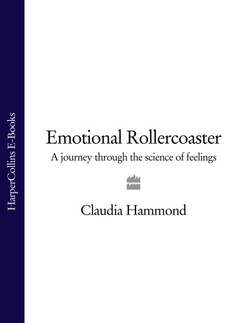Emotional Rollercoaster: A Journey Through the Science of Feelings

Реклама. ООО «ЛитРес», ИНН: 7719571260.
Оглавление
Claudia Hammond. Emotional Rollercoaster: A Journey Through the Science of Feelings
Emotional Rollercoaster
Claudia Hammond
Table of Contents
Introduction. Germany, October 1944
One Joy
the importance of new sandals
the joyful brain
the joy of exercise
smiling
an experiment
the laughing umbrella
the laughter epidemic
the purpose of joy
the route to a happier life?
Two Sadness
the purpose of sadness
the sad face
the sad mind and the sad body
a diagnosis of depression
why do only some people become depressed?
the mystery of tears
zeis, manz and the crypts of henle
the message of tears
the quintet of the astonished
Three Disgust
how we learn to feel disgusted
the disgusted brain
individual responses to disgust
the suppression of disgust
the purpose of disgust
the bag of disgust
matter out of place
flesh on the banister
the fascination of the disgusting
disgusting fun
condemnation through disgust
Four Anger
what’s anger for?
self-defeating rage
when anger begins
anger at work
anger and the brain
is it bad to bottle it up?
twenty-first-century anger
Five Fear
how our fears change
kwolls and kwokkas
the fearful brain
the fearful body
scared to death
the smell of fear
when the fear system goes wrong
the twilight world of intensive care
the memory of fear
the mind’s ability to reduce fear
seeking fear
the heart of fear
Six Jealousy
wonky features
when jealousy becomes a problem
morbid jealousy
does jealousy have a purpose?
jealous babies
jealousy v. envy
Seven Love
is love a basic emotion?
is it possible to study the science of love?
what is love for?
the mysteries of sexual attraction
the scent of love
when do we fall in love?
love on a bridge
love is good for you
love hormones
the life-long devotion of the prairie vole
the strange situation
Eight Guilt
learning to feel guilty
the wasted emotion?
the detection of guilt
the look of guilt
does the body reveal what the mind conceals?
hot faces, guilty minds
the guilty brain
guiltless
survivor guilt
Nine Hope
the importance of hope
enduring hope
hope and health: a gift from arden house
the nun study
instilling hope
high hopes
false hope
Afterword
Bibliography
the science of emotions: general references covering several emotions
development of emotions in children
joy
sadness
disgust
anger
fear
jealousy
love
guilt
hope
P.S
An Emotional Optimist Louise Tucker talks to Claudia Hammond
Life at a Glance
Favourite Books
A Day in the Life of Claudia Hammond
The Joy of Penguins by Claudia Hammond
If You Loved This, You Might Like… Mutants
The Sad Truth About Happiness
Authentic Happiness
Emotion: the Science of Sentiment
The Man Who Mistook His Wife for a Hat
Emotional Intelligence: Why It Can Matter More than IQ
Making Happy People
Happiness
Find Out More. Surf
Index
a
b
c
d
e
f
g
h
i
j
k
l
m
n
O
p
q
r
s
t
v
w
y
z
Acknowledgements
About the Author
Praise
Copyright
About the Publisher
Отрывок из книги
A Journey Through the Science of Feelings
London, New York, Toronto and Sydney
.....
There is some more good news for people who prefer to sit still. Professor Morgan also found that when he asked people to sit in a quiet room in a comfortable old leather armchair or lazyboy, as he calls it, for the same length of time as an exercise session, they felt just as good afterwards.
A final theory of why exercise might make you feel good is the thermogenic hypothesis – the idea that you feel happy after exercise because your body temperature has increased and that it is this high temperature which is responsible for the release of beta-endorphins, which in turn make you feel good. Not surprisingly, research in this area began in steam baths and saunas in Scandinavia. In one study back in 1972 the volunteers who took part had a twenty-minute sauna followed by a ten-minute shower for which they were paid in cash and in beer. Before and after the sauna the mood of the volunteers was measured. Beforehand two of the twenty male volunteers had warned the experimenters that they didn’t like saunas and indeed four people did find the sauna so stressful that they had to be let out early. However, overall people did feel less anxious after the sauna, but so did the control group who had undressed, sat waiting on a bench for twenty minutes and then had the ten-minute shower.
.....